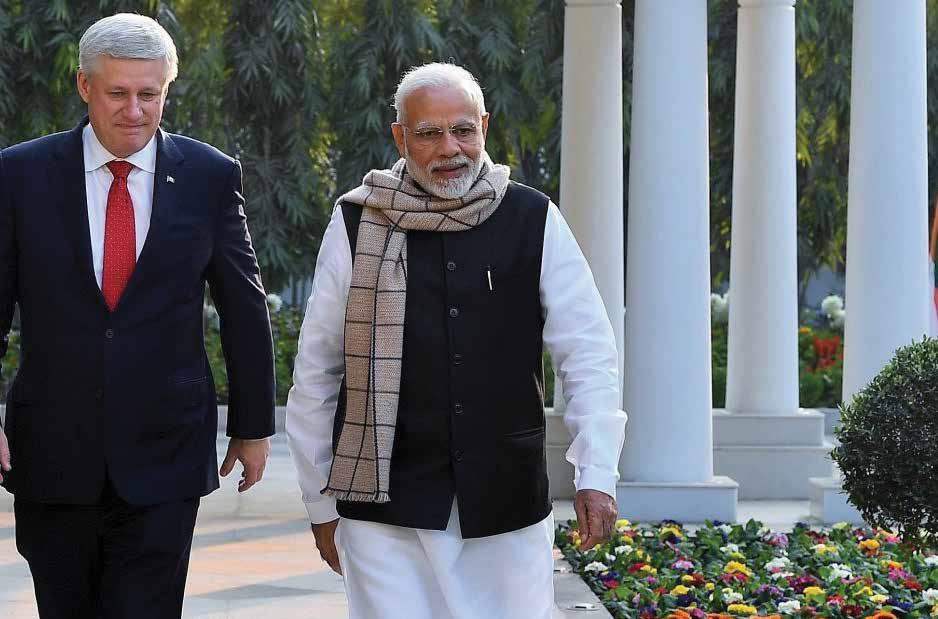
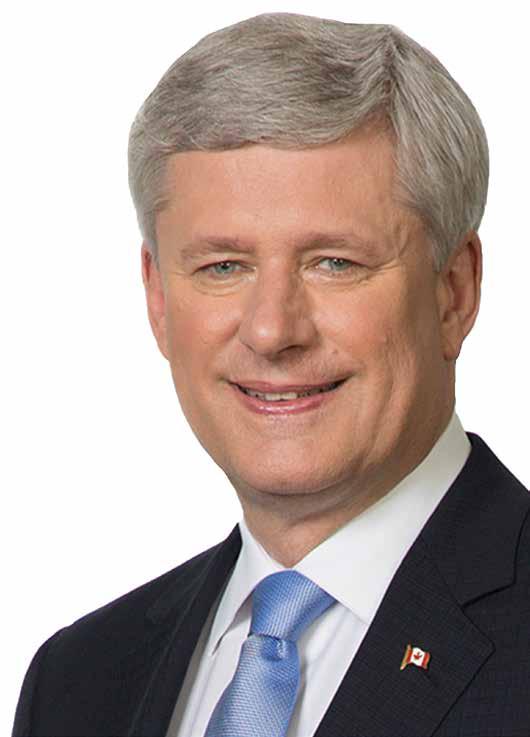



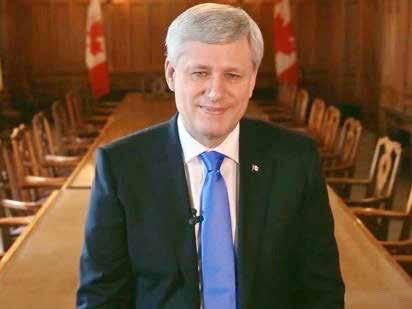
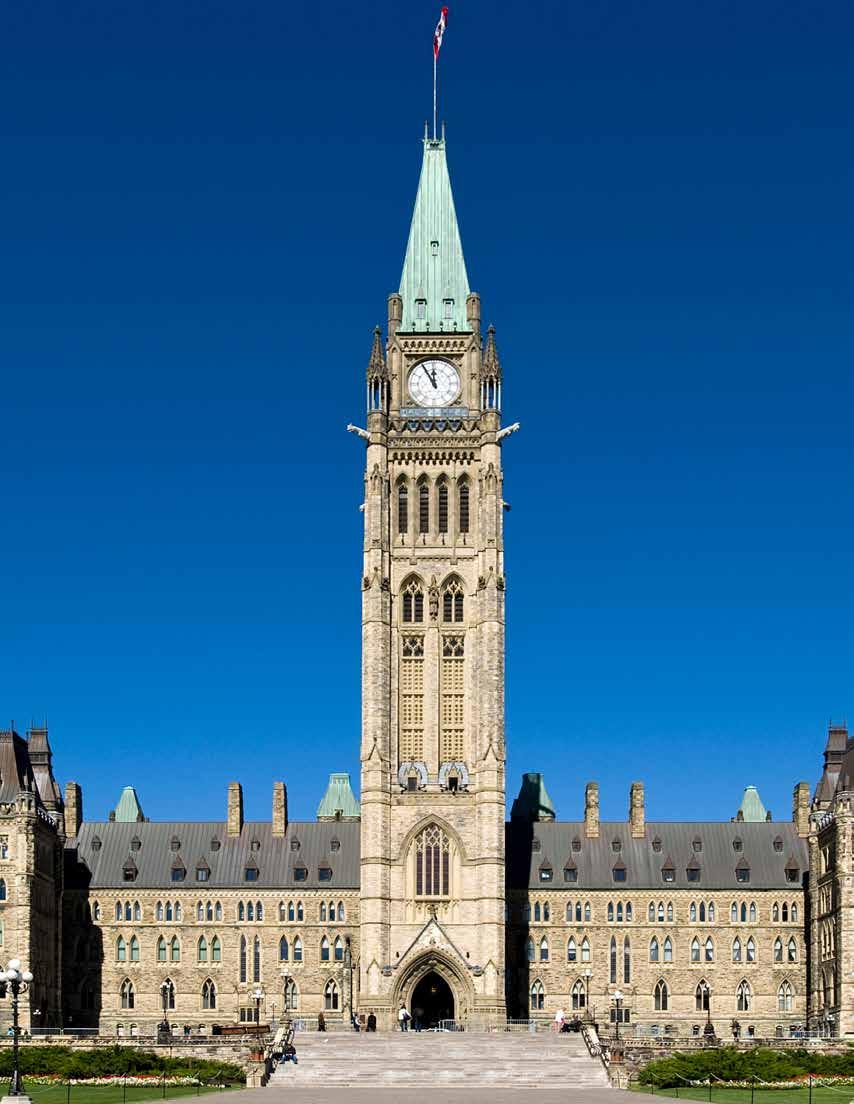
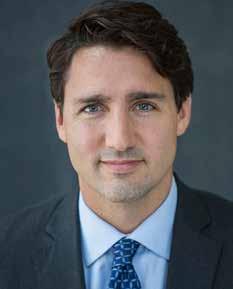

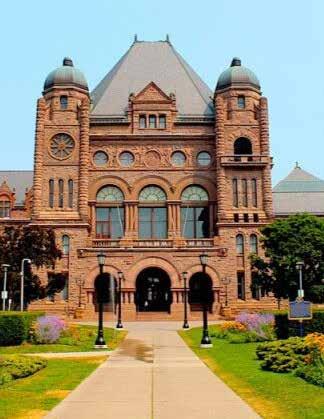

















On behalf of the Government of Alberta, it is my pleasure to send greetings to the 2019 Canada India Foundation Global Indian Award Gala.
The enduring economic and cultural bonds between India and Canada are the foundation of a relationship that can, and has, benefitted the people of both countries. I count it as an honour to have worked with one of Canada’s great statesmen, the Right Honourable Stephen J. Harper, as he ushered in a new era in India Canada relations. He truly exemplifies global leadership, vision and personal excellence, and his legacy is inspirational. I am proud to congratulate him as he is recognized this evening
Thank you to the Canada India Foundation for its commitment to fostering co operation and collaboration between our two great nations , and to raising the profile of the Indo Canadian community. I look forward to continuing to build upon Alberta’s connection with India, and to exploring opportunities that will contribute to our mutual prosperity and quality of life .
Best wishes as you celebrate.
Hon Jason Kenney, Premier of Alberta

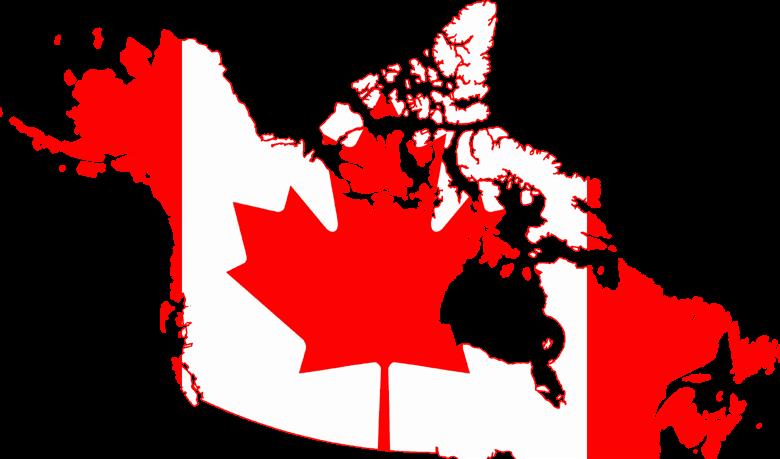
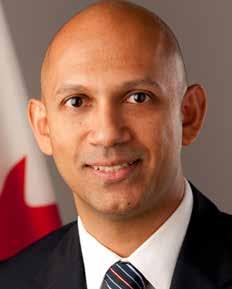


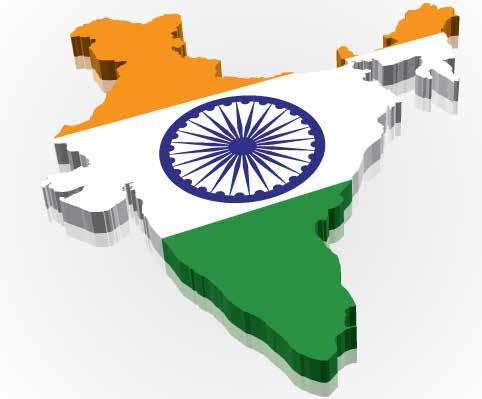


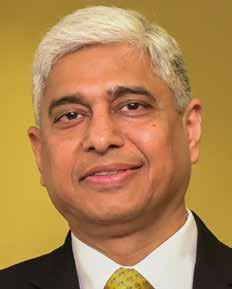


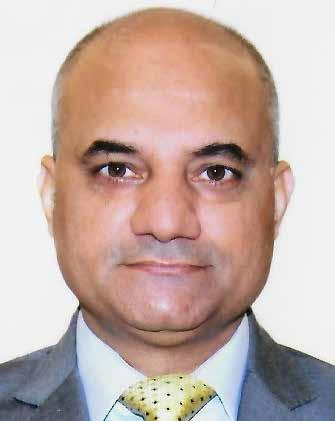

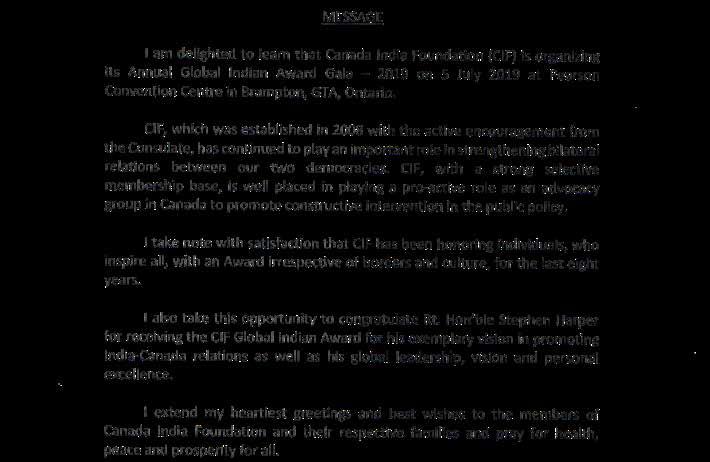
Canada India Foundation (CIF) is a national, not-forprofit, nonpartisan, non-governmental organization established with the following objectives:
• Foster bilateral relations between Canada and India
• Create opportunities for qualified Indo-Canadians in the public sphere
• Create a better understanding of the new India among Canadians & protect Canada’s interests in India
• Annually recognize & honour a prominent global Indian achiever. CIF Global Indian Award is presented to an outstanding person who has demonstrated global leadership, vision, and personal excellence
• Organize sectoral forums that enable a better understanding of the expanding economic relations between Canada and India
• Position the need for a strategic partnership between Canada and India as critical to Canada’s future.
Since its inception in 2007, Canada India Foundation has taken a leadership role in fostering stronger bilateral relations between Canada and India through active participation in the public policy debate and engagement with Parliamentarians, CIF plays a pivotal role in transforming Canada’s relations with India by emphasizing India’s criticality to Canada’s future
CIF works towards raising the profile of Indo-Canadian
community by facilitating:
• Participation by qualified Canadians of Indian origin in the policymaking and the legislative process and within crown agencies, government boards and judicial and quasi-judicial tribunals
• Engagement with federal and provincial elected representatives on crucial bilateral issues such as trade enhancement, national security, simplifying immigration procedures, professional accreditation
CIF takes an active role in increasing the awareness among Canadians about the changing face of India, and the promotion of Canada’s interest in India. CIF members are among Canada’s top industrialists, entrepreneurs, corporate executives, and top-tier professionals. Together, CIF members provide employment to a few thousand Canadians, and they are key influencers of Canadian public policy enjoying tremendous pelf and prestige in Canada.
CIF proactively assists in shaping a definitive proIndia policy framework in Canada by working with decision makers in the federal and provincial Canadian governments. Policy analysts following the amazing progress of Canada – India relations concur that substantial improvements have occurred in the last ten years – coinciding with the formation and growth of CIF.
CIF members are dedicated philanthropists who continually donate for a cause globally and especially in Canada and in India.
Rt. Hon Mr. Stephen Harper, Premier Doug Ford, High Commissioner His excellency Vikas Swarup, MPs, MPPS, all dignitaries, my friends & my fellow CIF members
Welcome friends to Canada India Foundation’s twelfth Annual Global Indian Award Gala for 2019.
Today, we take pride in honouring an outstanding Canadian leader who has demonstrated global leadership, vision, and personal excellence. That person is the Right Honourable Stephen J Harper, the 22nd Prime Minister of Canada.
In its 12-year history, this is the first time that the Foundation is bestowing the Award on a Canadian political visionary, and the reason is obvious: During his tenure as Prime Minister, Mr. Harper demonstrated his sound understanding of the significance of Canada’s relationship with India and built a solid foundation for bilateral relations between our two democracies. Canada India Foundation take immense pride in bestowing the Global Indian Award to Mr. Harper.
This year, our Foundation is celebrating a dozen years since its inception. We benefitted in our formative years because those years overlapped with Mr. Harper’s tenure as Canada’s Prime Minister. Our Foundation has had, and continues to have, excellent experiences working with Mr. Harper to foster bilateral relations. You will recall Mr. Harper was the chief guest and the keynote speaker at our first Gala in 2008. We worked with Mr. Harper and the former Indian President Dr. Abdul Kalam to pave the way for the nuclear deal between Canada and India. There are innumerable instances that I can recount that emphasize Mr. Harper’s keen desire that
Canada and India become the best of friends.
Friends, India has recently witnessed history in the making when Narendra Modi won an absolute majority in the Indian parliamentary elections. Everyone will agree that under Prime Minister Narendra Modi’s leadership, India will confidently march into the future to occupy its rightful place at the helm among the comity of nations. The result reflects the deep appreciation that most Indians have for Narendra Modi’s policies which are transforming India into the world’s fastest growing economy and pushing hundreds of millions of Indians out of destitution.
In January this year, just before the election campaign began, Mr. Harper was in New Delhi, and his tweet reflected the mood in India. I quote, “The most significant leader of India since Independence, my friend @narendramodi is shaping every conversation on geopolitics & the global economy. For India to realize its potential, it needs the courageous & visionary leadership of Prime Minister Modi. Proud to stand with him.”
Friends, the two main objectives of our Foundation are to foster bilateral relations and to create opportunities for qualified Indo-Canadians in the Canadian mainstream. To achieve these objectives, we have adopted a 360-degrees approach that emphasizes the criticality of India and of Indo-Canadians to Canada’s future.
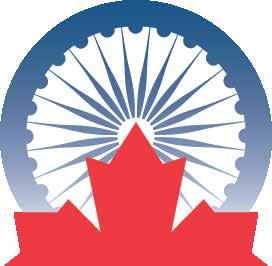
Economically, India offers Canada a large and maturing market that will reach its full potential in the next decade. To his credit Mr. Harper did everything in his power to enhance relations including expanding Canada’s network of trade commissioner in India. Today, India

has the second-largest network – after China – of trade commissioner offices.
We have all been saying for the better part of the last 15 years or so that the Canada – India economic relations have immense potential that will lead to economic growth for Canadians. Unfortunately, this potential has not materialised into a fact, and Mr. Harper’s target of $15 billion in bilateral trade by 2015 is nowhere in sight. Hopefully, the changing global dynamics of trade will bring Canada and India closer soon.
I want to now discuss the role of Indo-Canadians in shaping the future of our Canada. We are 1.3 million strong and our numbers are steadily rising. In addition, there are nearly 200,000 international students from India who are pursuing higher education in Canada.
The Indo-Canadian population reflects the diversity and complexity of India – we represent many languages, many religions, many ethnicities and many cultures.
Just as multiculturalism is inherent to Canada, it is the basis of the Indian civilisation and every diasporic Indian carry within him or her these values of unity in diversity.
As a people, we are proud to be different and yet we are indeed one community.
In Canada, Indo-Canadians have come to represent a political force that can and does influence political outcomes. We have worked with our partners in government at all levels to advance Canada’s interests in India:
Let me cite a few examples:
• CIF advocated for a renewed engagement with Gujarat, one of the most prosperous and industrialized regions of India. The federal government foreign policy makers in Ottawa had adopted an inexplicably biased and misinformed position of disconnection towards Gujarat, which was based on unfounded allegations and spurious media reporting and discourse.
The result: federal and provincial politicians now regularly travel to Gujarat and engage with Gujarat state political and business leaders.
•By working the civil nuclear cooperation file and
showcasing India as a responsible user of nuclear technology and materials for civilian purposes, that it demonstrably is.
The result: the promulgation of the Canada-India Nuclear Cooperation Agreement after decades of isolation of India in this sphere.

• And quite simply, by fostering support for elected officials who make the time and the commitment to hear the aspirations of Indo-Canadians, for those aspirations are no different from the aspirations of all well-meaning Canadians – to live in a free and democratic society, to pursue meaningful economic pursuits for the betterment of our families and to ensure the security and well-being of our country.
Often these initiatives require us to take action to ensure that Canada continues to be the model for a secure democratic nation free from the whims and fancies of wayward politicians kowtowing to the calculated demands of extremist elements that exist in our society.
Recently, in Canada, an Indian diplomat was refused permission to unfurl the Indian flag at a public gathering apparently because the program in which he was the chief guest, coincided with the anniversary of Operation Bluestar. We learnt that permission had been denied because it was deemed a sensitive issue after the city received emails protesting the unfurling of the Indian flag at this time would hurt sentiments.
Now, I am sure everyone will agree that it is unacceptable to allow a handful of members of a community to hold to ransom Canada – India relations. Canada India Foundation took up this matter with the seriousness it deserved and gathered representatives of a number of Indo-Canadian organisations to educate and inform the city leaders of India’s diversity as represented in the Indo-Canadian population. It needs to be said clearly that Canadian political leaders must have the courage to resist overtures by those elements who are dedicated to the disruption of a strengthening Canada-India relationship.
Canadian politicians, marching in parades featuring placards celebrating terrorists, or endangering the bilateral relationship by passing resolutions denouncing the 1984 riots in which many Sikhs – as well as a smaller number of Hindus – lost their lives, as a genocide (as the Ontario legislature did in 2018), are simply shameful acts of vote-bank politics. They compromise our democratic institutions and security establishment, and ultimately endanger lives of Canadians.
And, if this is to continue, it is only a matter of time before a majority of Indo-Canadians will follow the example of what occurred in India in the 2019 elections and unite to give voice to the aspirations of the majority of Canadians.
Friends, as a Canadian organisation, the Canada India Foundation believes in the right to free speech, and the right of an individual and an organisation to express their political opinions, especially when such views are at variance with the majority opinion.
However, it is time to call out those who have continued to spread untruths to further their political agendas. In Canada, a large section of the political establishment has been led to believe that the 1984 anti-Sikh riots characterize the circumstances of the Sikh community in India. This is nothing but a canard, an unfounded rumour that has acquired both credence and momentum because of persistent propaganda.
Today, the demand for an independent state of Khalistan is only heard in Canada, and shockingly, it is still taken seriously by certain political players in Canada. Politicians in Canada who continue to claim the victimisation of one religious minority community or another in India are unaware or unwilling to accept the present Indian reality where a majority of Indians are focused on pursuing economic goals and the Indian state is enabling this wish fulfillment by doing its best to usher in policies that help rapid economic development for all Indians. They also choose to ignore India’s syncretic and secular traditions, which are not only constitutionally enshrined, but have always been a way of life for a majority of Indians.
It is time for all Indo-Canadian organisations working

within our growing community to consider working together on the agenda of protecting the political interests of India in Canada and of Canada in India. We can all continue with our own mandates, but we should all be of one voice when it comes to putting an end to lies and fake news. Eventually, we may consider forming a federation of all like-minded Indo-Canadian organisations and such a united front will emerge as the political voice of the new Indo-Canadians who believe that the time is now ripe to move resolutely ahead to a better future, and not remain stuck in the quagmire of the past.
Before I conclude, I want to make an important announcement. Friends, most of you will remember Ajit Jain, the journalist who recorded the journey of the Indo-Canadian community for over three decades. He passed away in 2018. Ajit published the A-List that annually published profiles of high achievers from our community. Canada India Foundation is joining hands with Ajit Jain’s family to continue his legacy and publish the A-List annually. Our Foundation is thankful to Ajit Jain’s family – his wife Rosalinda and his children Lakshmi and Ajit – who have given us permission to publish the A-List. They are with us today as our special guests. As part of this agreement, CIF will create an annual bursary of $1,000 for a period of ten years that will be given to the most suitable student in the South Asian Studies Department of the University of Toronto.
Last but not the least, I want to thank all the sponsors who have supported us every time and special thanks to my CIF team who have supported every initiative that our executive team has taken up and helped me in particular to help grow CIF vertically as also horizontally. Special thanks to Pankaj Dave who have made this gala a success as usual.
Thank you everyone for your presence and patience. We have an evening full of thought-provoking speeches, entertainment, a fall side chat with Mr. Harper, and, of course, exquisite Indian cuisine. So, sit back and enjoy the evening.
*AnilShah istheChairofCanadaIndiaFoundationand thePresidentofNi-MetMetalsInc.




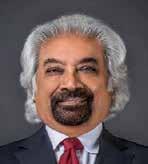


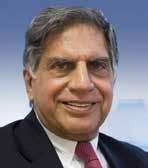
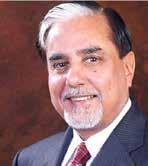


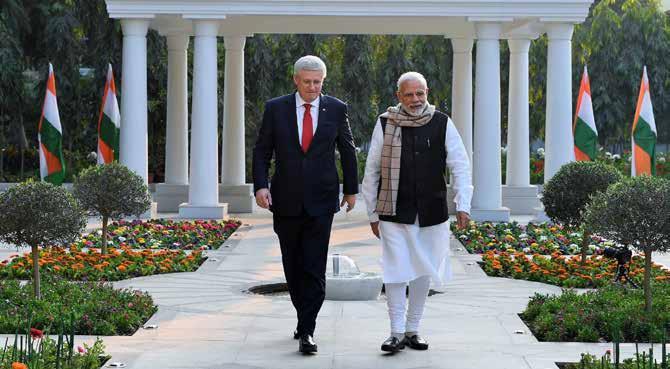

Canada is one of the richest nations in the world- one which is endowed with a large land mass and vast reserves of natural resources. With third largest reserves of petroleum and largest fresh water reserves it is considered an energy superpower. A small population of 37.49 million people, tenth largest economy with a GDP of 1.65 Trillion USD growing at 2.1 percent. Most Canadians experience well being with high outcomes of health, education, skills, social connections and environmental quality.
The greatest uncertainty in the Canada’s economic outlook today is presented by restrictions in global trade. The second big risk is posed by soaring house prices which has resulted in household debts to the extent of 170 percent of disposable incomes. Its ageing population is reducing the contributing of labour utilisation. Although following progressive policies to welcome skilled migrant population, it is a country which remains one where it is difficult to achieve scale, particularly in the shadow of very large well-developed market of United States of America (USA).
Given 75 percent of Canada’s trade with USA and its export mix, it exposes Canada to developments in US economy and commodity markets. The United States, Mexico, Canada Agreement (USMCA) signed on November 30, 2018, clearly places USA in charge of the trade relations of USA- Mexico- Canada with the rest of the world. Section 232 tariffs are a sore subject for Canada where a side agreement would provide a shield from Auto tariffs under 232.
Similarly, article 32.10 puts constraints on Canada’s ability to forge free trade agreement with China. As recent events related to Huawei executive have
demonstrated, it is difficult for Canada to navigate deteriorating US-China relationship. In the light of these developments, Academic- Research- Industry circles in Canada are advocating diversification of Canada’s trade relations. While it is clearly visible that USA will remain a dominant partner for Canada, it is in Canada’s interest to look beyond. It is here that India’s scintillating growth and reform story becomes very important to Canada.
It is well known that much of growth over the next decade will continue to come from Asia- led by China and India. India particularly is a country to watch out for. Not only is it the fastest growing large economy in the world, it’s over 2.7 Trillion USD economy expected to grow at 7.2 percent in 2019, poised to take place as the third largest economy in the world by 2030. 65 percent of its 1.3 billion population is under the age of 35. It is a country whose half the population comprises middle class and is increasingly aspirational and ready to try new products and services.

The two countries share trade of just over 8 billion USD, a miniscule about one percent of trade for both countries.
FDI from Canada into India is about 1.12 Bn USD between 2000 and 2017. India’s investment surpasses Canadian investment with about 3.7 Bn USD in Canada. Canadian investments into India have primarily come into the services sector which accounts for 36 percent, while investment in the construction (infrastructure) sector has been 12 percent. Indian companies on the other hand have invested especially in the IT, software, steel and natural resources sectors of Canada. These relatively small numbers bely the yet untapped potential which exists.

India and Canada shared a cold vibe for a long time with strain over events such as India’s nuclear tests in 1974 and 1998 and bombing of Air India’s flight 182 on route Toronto to London in 1985. Although efforts were made intermittently to engage with many bilateral visits, with this baggage, the two countries could not leverage the opportunities for collaboration. Canada particularly could not leverage the opportunities offered by India upon liberalization which have been very well reaped by countries like Japan and Republic of Korea. After years of efforts to thaw the relations on both sides, Sun seems to be finally shining on the relations between the two countries.
Today, at an official level, the two countries cooperate in a range of areas including trade and investment, finance, energy, counter terrorism, security, agriculture and education. Why the two countries share enduring commitment to democracy and plurality and the needs of the two countries perfectly complement each other, there is a huge potential waiting to be tapped. The strong people to people connect - the rich Indian diaspora and a thriving Indian student community in Canada can potentially help strengthen the economic ties.
India’s stupendous growth is coming from massive stimulus to it infrastructure- railways, highways, metro rail projects, airports and smart cities. By 2030, about 600 million people will likely live in India’s cities. Therefore, urban development and smart cities mission promise to provide massive opportunities for growth. Infrastructure will require an estimated investment of about 1 Trillion USD by 2030. With Canada’s known strength in infrastructure development, this holds immense promise for a strong collaboration.
India has set a target of 175 GW of renewable energy by 2022 of which 63 GW has been achieved. Considering India’s large and growing energy needs, Canada- the energy superpower stands to reap rich dividends with investments in this area. Solar cell and module manufacturing along with research in green technologies
can be a potential area for collaboration. Canada has a leadership position in artificial intelligence which can be leveraged to unleash a revolution in healthcare, customer service, retail, transportation and human resource development sectors.
As 65 percent of India’s population under 35, it is imperative for India to develop its human capital to reap its demographic dividend. Creating opportunities for world class education is another powerful area for collaboration. In this area Canada already has achieved success. About 1,25,000 Indian students studying in Canadian universities represent about 25 percent of international students in Canada. The 1.2 million strong influential and affluent Canadians of Indian heritage which comprise 3.6 percent of Canada’s population (as on 2017) not only form a vital bridge between Canada and India but are also a source of young skilled taxpayer workforce.
Leverage India’s red carpet and changing investment climate India today not only offers a growing market, an aspirational middle class willing to try new products and services, today it lays out a red carpet for foreign investors. Transformative measures including legislative and regulatory changes, process engineering have given a fillip to build business friendly investment climate and enhance ease of doing business. The FDI policy has been liberalized such that most sectors barring a few allow 100 percent FDI under automatic route. Several deep and structural reforms including implementation of Goods and Services (GST) have been implemented.
Over 1400 laws have been scrapped, extensive measures have been taken through out the country to enhance ease of doing business which is reflected in a sharp improvement of 65 ranks in Doing Business Report from 142 in 2014 to 77 in 2019. The reform efforts which have accelerated and intensified in the last five years under the Narendra Modi government have witnessed a stupendous rise in FDI from 323 Billion USD accumulated between 2000 to 2013-2014 to 592 Billion USD in 2018-19 till December 2018.
Certain sectors such as infrastructure, transportation and food processing already have tasted success in India. Over the last 25 years, Bombardier has become a strong partner in India’s modernisation and expansion of transportation systems, supplying signalling and train control solutions, manufacturing locally for the Indian Railways but also executing projects for Delhi Metro, Mumbai Vikas Rail and even Queensland Rail in Australia. The company has also made India a base for supporting projects in several countries.
Another fine success story is that of Mc Cain Foods (India), a subsidiary of the largest Canada based potato specialities manufacturer. Commencing its journey in 1998, McCain is today, a very popular frozen food family snack brand in urban India. With its nimbleness in understanding of Indian market, that it has brought out delectable localised version of French fries and launched new products adapted for the Indian market like Masala Fries, Aloo Tikki and Mini Samosas.
There are several others who remain bullish about India including Fairfax Holdings and Magna International with a dozen manufacturing units in India, there are many stories in the making, waiting to be told.

To truly achieve the potential the collaboration between Canada and
India holds, first and foremost, the Canadians need to give up the baggage of the past and embrace India fully to catch up on the lost time and terrain. The trade and investment promotion organizations and industry chambers in both countries need to work closely with their counterparts on either side to mine opportunities and try to encourage the many medium enterprises also to do business with India.
India needs to conduct strong outreach- share its reform journey and focus on liberalization of investment policy, enhanced ease of doing business and predictability and stability of policy regime. Finally, robust mechanisms which are cross functional, multidisciplinary, industrygovernment interfaces need to be evolved where both sides can jointly work to systematically facilitate investment and support resolution of issues and difficulties faced by investors.
*Vandana Kumar is Joint Secretary, Ministry of CommerceandIndustry,GovernmentofIndia.
Indian Prime Minister Narendra Modi was resoundingly re-elected on May 23 as leader of the world’s largest democracy. Modi’s Bharatiya Janata Party (BJP) swept over 300 seats in the Indian Lok Sabah, or lower house of Parliament. The authoritative win now gives Modi’s BJP an even stronger legislative majority, with the nearest rival, the Indian National Congress led by Rahul Gandhi, with only 52 seats. The win is not only significant politically for Modi, but it also represents a success of democracy, where nearly 70 percent of eligible voters cast their ballot.
Modi’s strong support continues to transform Indian politics as well as India’s role in the region. Delhi continues to incrementally build up its partnership with the United States and has forged a strong bond with Japan, pledging to work together to promote a free and open Indo-Pacific region. The growth in a strong and principled Indian vision for the region has grown amid the rise of its neighbour—and often rival—China. Beijing’s rapid modernization and expansion of its military, in addition to its aggressive push for influence in India’s backyard through its Belt and Road Initiative, has forced Delhi to reassess its approach to regional security and prompted its warmer embrace of key stakeholders also concerned about China’s rise.
Canada also has shown an interest in being more engaged in the Indo-Pacific region. During the visit of Japan’s Prime Minister Shinzo Abe to Ottawa in late April, Canadian Prime Minister Justin Trudeau noted a “shared vision for maintaining a free and open IndoPacific region based on the rule of law.” The statement was Canada’s first high-level endorsement of the importance of Indo-Pacific strategies, of which many key regional players have already adopted, like the United States, Japan, Australia, India, and Indonesia.
But, while the visit with Japan was the first upfront embrace of the Indo-Pacific concept, Ottawa has in fact already outlined its shared views on the region

through its joint statement with India in February 2018. In that statement, the two sides agreed to “reaffirm the importance of lawful commerce and the freedom of navigation and over-flight throughout the Indo-Pacific region, in accordance with international law.”
The convergence of interests between India and Canada for a stable and rules-based region underscores the imperative for resetting an underperforming bilateral relationship. But, while Trudeau’s visit last February aimed to elevate ties to a strategic level, the results remain uninspired at best. Rather than aligning more closely with India, the week-long visit has now become an infamous model for how not to conduct diplomatic summitry.
Moreover, the state of relations with India remains mired in mistrust due to a poorly handled management of the aftermath of Canada’s inexplicable invitation of a Sikh extremist, Jaspal Atwal, to a dinner event at the Canadian High Commission in New Delhi last year. This issue was even more sensitive because India has long been distrustful of Ottawa’s approach to what it refers to as Sikh extremist groups based largely in British Columbia.
In addition to disagreements over the nature of Sikh extremism, the two sides also continue to be at odds over taking the next step to enhance trade relations. After several rounds of negotiations, Canada and India remain far apart on a potential free trade deal. The two sides also remain unable to sign a complementary foreign investment promotion and protection agreement, despite negotiating for more than a decade.
One of the largest obstacles to trade and investment deals has been failed attempts to narrow gaps between Ottawa’s agenda for “progressive trade”—one that provides strong protections on issues such as gender, environment, labour, and human rights—and Delhi’s desire to be treated as a non-market economy. India, meanwhile, continues to insist on maintaining some of its protectionist barriers and tariffs to protect key sectors in agricultural areas for example, while promoting the need for labour mobility as a key to any deal with Canada.
But despite these trade hurdles and strains over Sikh extremism, Modi’s triumphant re-election should
signal to Ottawa—and the world frankly—that India’s transformation and strategic role continue to rise apace. Rather than muddle through an underperforming relationship, Ottawa should take this opportunity to reengage and reset its approach to India. This is particularly relevant considering Canada’s strained relations with China, plagued by Beijing’s arbitrary detention of two Canadians in response to the arrest of Huawei chief financial officer Meng Wanzhou last December. It is also critical to our attempt to strengthen relations in the IndoPacific region, premised on states that support a rulesbased order, including the freedom of navigation and fair and open investment and infrastructure development.
The first step will be to engage with Delhi on a comprehensive manner on security issues, without marginalizing or downplaying the Indian government’s concerns about extremism and its impact on India’s own security. This does not mean Canada and India will come to an agreement on the issue of Sikh extremism, However, this issue needs to be addressed consistently and thoughtfully in order for both sides to pursue further security cooperation in other areas, ideally as part of the emerging Indo-Pacific approaches from both sides.
Second, on trade, it will be difficult to narrow the gap for a high-threshold free trade agreement, but it is important to continue to look at ways to engage the growing Indian economy and find areas of collaboration that make sense, especially in areas such as technology and artificial intelligence, where India is innovating at a fast pace.
Simply, the Canada-India relationship remains one of high potential but low impact. With growing uncertainty in the region, and a difficult road ahead in relations with the region’s biggest economy—China—it makes sense to reset the deck and double-down on engagement with India.
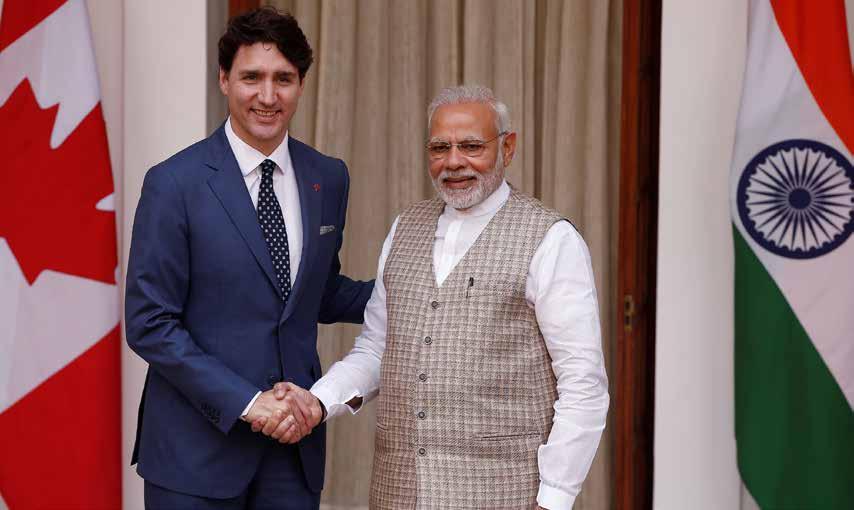
a senior fellow at the MacdonaldLaurier Institute (MLI)
deputy director of MLI’s
India with a projected growth rate of 7.1 percent is the fastest growing economy in the world. Fostered by this unprecedented growth, combined with a population exceeding 1.2 Billion, India will see a surge in infrastructure demand in the coming decade.
India needs $4 trillion investment in the infrastructure sector in the next two decades. CIF Global Forum on Infrastructure,SmartCities&SmartVillages 2020’willfocusonkeyareasofCanada–Indiacollaborationinthissector
Canadian and Indian public and private entities and the academia.
By Vinod VyasThis infrastructure expansion will be across India both in urban and rural centers. Success by Canadian Government in this field can be replicated through following similar models in India. Canadian companies can play key role in facilitating this need for infrastructure development through transfer of technology and active participation in these mega projects.
Another key area of collaboration can be between Canadian Academia and premier institutes of technology (IITs IIS, etc.) in India, sharing and jointly developing advanced infrastructure technologies and management tools. These can then be used in efficiently delivering the mammoth infrastructure projects that India is bound to implement in the near future.
This can usher an era of infrastructure revolution with Canada as key player. It is similar to the wireless revolution, India is going through in the telecom space although this may be even bigger than that. Moreover, the ‘Transfer of Technology’ sits well with the current Prime Minister – Narendra Modi’s mantra of ‘Make in India.’
Canada India Foundation (CIF) constantly strives to identify and work on policy matters that foster bilateral relations between Canada and India. One of the many vehicles that CIF employees to achieve its objectives is by organizing, sectoral forums that enable a better understanding of the expanding economic needs of India.
The objective of these forums is to translate these meeting of minds into strategic partnership between Canada and India which are critical to Canada’s economy. In lines with this objective CIF is organizing ‘CIF Global Forum on Infrastructure, Smart Cities & Smart Villages 2020’.
This world class Forum will have active participants from
In this forum, CIF will facilitate multitude of stakeholders to interact in thought provoking sessions on current issues and trends and technological advancements. Breakaway sessions for the participants who wish to accelerate collaborative effort will also be facilitated.
Some of the key stakeholders identified are – physical service providers for e.g. construction and engineering design companies, TELCOs, digital service providers – technology companies, service receivers for e.g. various levels of governments and Crown corporations in Canada and similar entities in India, Academia e.g. Universities, Centre of excellence and finally Not-forProfit organizations actively involved with infrastructure, smarter cities and smarter villages projects.
The prime focus of the smart cities and smart villages initiative is on enhancing or even revolutionizing the city services both physical (infrastructure) and digital. These are focused on driving efficiencies or creating new services through digitation and cross-pollinating technologies like portals, mobility, IoT, open data, etc. However, a key aspect often ignored at peril is the social aspect of these initiatives. Quebec is the leader in the social aspect in Canada and this can have a strong bearing on the smart village initiative in India. The forum will focus on all three aspects Smarter Cities and Smarter Villages – Physical (Infrastructure), Digital and Social.
The expected outcomes from the forum will be enablement of Public-Private, Public-Public partnerships and academic collaboration on Infrastructure, smarter Cities and Smarter Villages initiatives across Canada and India.
* VinodVyasistheFounderofParthoTechnologiesInc. and a member of the Board of Governors of Canada IndiaFoundation.

Ajit H. Someshwar is an IndoCanadian entrepreneur, philanthropist and social activist based in Toronto. He is President & CEO of CSI Group. He is the cofounder and current Chair of Canada India Foundation. Someshwar was appointee of the Government of Canada to the Board of the Export Development Canada. during the 2008-2009 global recession crises, Canadian finance minister Late Jim Flaherty appointed Someshwar to an 11-member advisory panel to advise him on the federal budget and the economy.
Amar Bhatia is President and CEO of Illuminex Technologies, which was founded in 2009, and International Data Systems. He is a committed philanthropist who has been involved with grassroots movements in India to educate girls. Mr. Bhatia is also actively engaged in mentoring and financing young entrepreneurs. He was an active member of the Million Dollar Pledge that the Indo-Canadian Friends of Osler made to donate $1million to the William Osler Foundation.
Ambrish Thakkar is restaurateur and a Tim Hortons network franchisee spread across Canada. He inspires his team members to bring more than themselves to work. His advice to them: a cup of coffee can be found at any store, but a welcoming atmosphere can’t. He launched Thakkar Group and established a network of Tim Hortons restaurants across the country. He stays connected with the business and community at grass-root level on daily basis and lives through his values and culture by his actions.

Anil Bhasin is a realtor for the last three decades. His ‘Ghar” brand is extremely popular amongst Canadians of Indian origin. Bhasin is a yoga enthusiast who was instrumental in getting Baba Ramdev to Canada in 2007 and was actively involved with the International Yoga Day Canada. He is a proactive philantropist, actively involved with the Million Dollar Pledge that the IndoCanadian Friends of Osler made to donate $1million to the William Osler Foundation, the Sunnybrook Hospital.

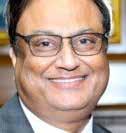


Anil Shah is the CEO of Ni-met Metals Inc. a large nickel and alloys trading and supply house with multiple associated offices globally with headquarters in Canada, and a scrap processing facility in Italy. He served on the board of The Trillium Hospital group (A consortium of several large hospitals in Ontario) and has chaired the Trillium Diwali Gala twice in the last decade, raising large amount of funds for the benefit of the hospital. Anil Shah is the present Chair of Canada India Foundation.
Barj S. Dhahan hails from a Sikh family from rural Punjab. He came to Canada in 1967 and has since lived in Vancouver, British Columbia. He is a graduate from the University of British Columbia and Regent College. Barj is the founder and chief executive officer of Sandhurst Group of companies, specializing in commercial real estate development. Sandhurst Group is also the largest Esso dealer and one of the largest Tim Horton’s franchisees in British Columbia.


AV Terrace Bay is a part of the US $41 billion Aditya Birla Group. Located on the shores of Lake Superior, AV Terrace Bay is a NBSK pulp mill producing over 330,000 tonnes annually. With over 360+ employees and $151 million invested over the last three years the company is focused on moving ahead and responding to future market change. The Terrace Bay Mill became the third Canadian company to join the Aditya Birla Group’s pulp and fiber business (Grasim Industries Ltd.) in July 2012.

Bhupinder Singh Khalsa is the Founder and CEO of Ranee Impex. A Geo-technical engineer, he came to Canada from India in 1986 and is a pioneer in introducing Indian Marble and Granites to North America and Europe. Bhupinder also supported a Grand Memorial for Canada’s fallen soldiers. Exquisitely carved in black granite and shaped as a Maple Leaf, this 15-tonne memorial is dedicated to Canadian Armed forces and placed at the premises of Canadian Museum of Hindu Civilization in Richmond Hill, Ontario.
Chirag Shah is a young technocrat who has rapidly scaled peaks of achievements by constantly striving to serve clients beyond their expectations. His company, Subhtech Solutions Inc., focuses on adopting innovative approaches to clients’ needs. Whether it is an advanced technology integration, implementation, customization in ERP, CRM, Cloud and mobile solutions, it prioritizes innovation. Chirag is also actively involved in advising individuals and businesses through his consulting service Vayam Mantu Advisors Inc.

Girish Kekre is the Vice President of Ni-Met Metals and Minerals Inc. as well as Ni-Met Resources Inc. He is a Chemical Engineer and brings in senior management experience and valuable expertise in non-ferrous and scrap metals. He was a process superintendent for Agro-Chemicals and Food Company, Kenya – a $ 100 million joint venture between VEW of Austria, Nanji Kalidas Mehta of Kenya and the Kenyan Government. In 1979, as an assistant manager, Girish undertook a rationalization project to revamp the 100 TPD oil refinery and 40 TPD Hydrogenation Unit.

Hariharan Gautam is the CEO of Grintex Technologies Inc. Canada (a subsidiary of Grintex India Ltd). He has been instrumental in introducing cutting edge technologies to India in the domain of jelly filled and optic fibre telecommunications, geo augmented GPS aided navigation system for a satellitebased navigation system, radar and state-of-the-art Air Traffic Control systems for aviation, strategic defense technologies, etc.
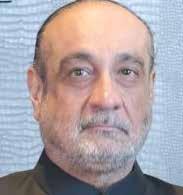
With an innate insight for business development and an unwavering commitment to helping the communities around him, Haresh Mehta has been an entrepreneur since the 1970s. Launching several highly successful companies that have been trendsetting pioneers in their respective industries, has been the founder, CEO and President of Eximcan Canada since 1992, a company with global footprint that specializes in a variety of business streams.
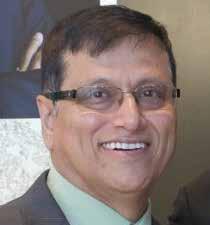
Hema Bhatt is the Vice-President, Natu’Oil Services, and the CoFounder, Bhatt Group of Companies. She immigrated to Canada in 2003 and in the following year started Natu’oil Services in partnership with her husband. Following the initial success of Natu’Oil, they setup Global Agri-Trade Corporation in the US in 2006. The Bhatt Group of Companies is involved products primarily from palm and coconut oils into animal nutrition, human food, and technical industries in Canada, USA, Malaysia, Singapore and India.

Mayur Kumar Dave is the cofounder and Managing Partner of C Shantilal Advisory Group Inc. and specializes in strategic advice for smart city planning and solutions. C-Sagi also provides client business development and advisory services. Born and raised in Kutch (Gujarat-India) and Engineer by training with a Diploma in Mechanical Engineering as well as a Post-Diploma in Business Administration, Mayur worked in the banking industry prior to starting his own niche advisory business.


Nick – Niranjan – Ladani is Founder and Executive Creative Director of Canada and India based a strategic brand agency DNL Core Design Inc. He has over 25 years of experience in advertising, branding, television production and designing brand experience. His entrepreneurial philosophy is simple – everything starts with one dot, and when you connect the dots it become a line. Nick believes that to truly transform a product, or a service, one must transform its core. As a designer, he adheres to a simple adage – Good Design is one that works.
Pankaj Dave is the National Co-Convener of Canada India Foundation and Founder & CEO of Manas International, trading Steel and Metal products globally. Having rich experience of over 20 years in the metal industry, Mr. Dave has led Manas International to exemplary growth and success. Lived and worked on three continents, he has carefully nurtured truly global associations. He has been contributing to Canada-India business, importing high valued goods from India; exporting leading steel producers’ goods to India.
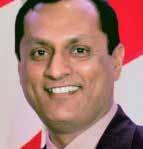
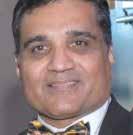
Pathik Baxi is a Partner at Simmons da Silva LLP where he is a key member of the firm’s Civil and Commercial Litigation Practice Group. With an emphasis on resolving complex commercial disputes, working closely with clients, providing general counsel and other external counsel across multiple jurisdictions within Canada and internationally, Pathik prides himself on achieving desired legal outcomes within set timelines and facilitating cost-effective resolutions.
Prashant Srivastava, MBA, is Director, South Asia at Seneca College. He oversees international student recruitment, business development and strategic partnerships in South Asia. Prashant has worked extensively promoting Canadian education overseas and developing skills development and entrepreneurship exchanges between Seneca and reputed educational institutions around the world.

Rahul Shastri is the Past-National Convenor, Canada India Foundation and Senior Partner, Kagan Shastri LLP based in Toronto, Canada and heads the firm’s litigation department. He has represented a myriad of clients, from both the private and public sectors, in complex disputes both within Canada and abroad. Rahul currently serves as counsel or in an executive position on several not-for-profit and charitable institutions.
Ramesh Chotai is the President, Bromed Pharmaceuticals Inc. He came to Canada in 1972. Starting as a Pharmacist/Manager at an Oshawa Pharmacy, he has built a successful group of companies that manufactures and distributes medical and healthcare products around the world. His company Bromed Pharmaceuticals became one of the leading pharmaceuticals companies bringing employment to several individuals and becoming one of the leaders in pharmaceutical formulation technology.
Ritesh Malik, father, husband and a spirited entrepreneur, is the first-generation immigrant to Canada, born into an illustrious business family. He became a global relocation and logistics professional after graduating from Delhi University and a master’s in business administration in global marketing, and successfully executed a challenging assignment of establishing footprint of O’Neil Software, world’s leading off-site records/information management software company in Asia, Middle East and Africa.


Rupesh Kapadia, CPA, CA, is the Managing Partner of Kapadia LLP, Chartered Professional Accountants. He was admitted to the institute of Chartered Accountants of India in 1995, Ontario Institute of Chartered Accountants in 2001 and CPA, Illinois in 2003. He has over 20 years of public accounting experience dealing with multinational companies and owner-managed companies. This has provided him with vast knowledge of financial and accounting systems. He also has a law degree from India.



Satish Thakkar, National Convener, Canada India Foundation and President, Excelsior Financial Group. Satish is a Canadian entrepreneur, a renowned professional, a committed community leader and a passionate philanthropist, with many accomplishments to his credit in a short span of time. In recognition of his contributions to enhancing Canada-India bilateral ties, the Ottawa-based Embassy magazine named Satish as one of the top foreign policy influencers in 2013.
Sunita Vyas is a serial entrepreneur with a drive for growth and a passion to build great companies. Over the last two decades she has forayed successfully into the Education, Entertainment and Marketing Sector. Currently as the CEO of Academy of Learning College, Mississauga and as a Board member of National Association of Career Colleges (apex body that strives to promote the interest of Private Career Colleges at the Federal Level), Sunita brings a wealth of experience and knowledge specific to the Canadian Education Sector.

Terry Papneja is the Founder of Dr. Papneja & Associates and the Founder, AIM for SEVA (Canadian Chapter). He presents a model combination of professional excellence (in his chosen profession as a dentist), entrepreneurial success and philanthropic zeal. After graduating in Dentistry from Indore, India, Terry Papneja moved to Canada in 1981. He acquired his degree in Dentistry from University of Toronto and opened his first dental office in Brampton in 1986.
V.I. Lakshmanan is an internationally renowned teacher, scientist and innovator in the area of sustainable development. He has more than 40 years of hands-on experience in technology commercialization and skills development initiatives with both private and public sectors including the United Nations. He has successfully guided process technologies from concept through development and demonstration to commercialization for resource, energy and chemical industries.
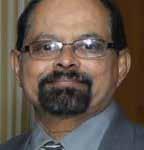
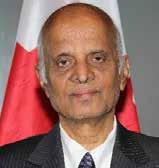

Vijay Sastry Kotamarti is a Certified General Accountant practising in Canada for the past 18 years and is also a designated Accountant from India, Kenya and Canada. Vijay is the Secretary of Canada India Foundation and has served as Trustee of Telugu Cultural Associations in Canada, India and Kenya and also on various other boards of social cultural and charitable organizations. He has interest in music and was producer of a radio show for 10 years on FM 101.3 in Canada and on television on Rogers 10 for about 5 years.
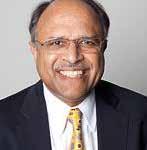
Vinod Vyas is a serial entrepreneur with a drive for growth and a passion to build great companies. Over the last three decades he has forayed successfully into Technology, Marketing, Entertainment and the AEC Sector. He is the Founder of Partho Technologies Inc. In his current role as Senior Partner he has been instrumental in creating, planning, and implementing the strategic direction for the company. He bears the overall responsibility for all departments in the company.
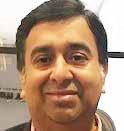

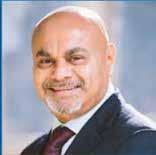
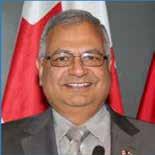
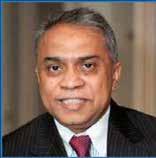
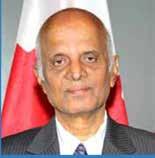
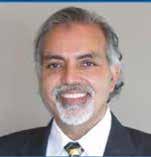

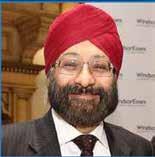


 Surjit Babra
Dr. V. I. Lakshmanan
Laj Prasher
Ajit Someshwar
Ramesh Chotai
Ajit Someshwar
Anil Shah
Aditya Jha
Barj Dhahan
Rahul Shastri
Surjit Babra
Dr. V. I. Lakshmanan
Laj Prasher
Ajit Someshwar
Ramesh Chotai
Ajit Someshwar
Anil Shah
Aditya Jha
Barj Dhahan
Rahul Shastri
the Higher Education Forum, the Annual Global Indian Award Gala and the Speaker Series. Mr. Anil Shah, National Convener, also invited the MP to the upcoming 3rd Golf Tournament that CIF is organising at the Royal Ontario Golf Club on August 8, 2018.
Commenting on the social media about the meeting, Hon. Sorbara said, “I had the pleasure to sit down with members of the Canada India Foundation and discuss how we can foster greater bi-lateral relations between the two countries. Canada and India share a special friendship and we are working together to create good, middle class jobs for Canadians and Indians alike.”
Canada India Foundation organized a meeting with a business delegation from India led by the PHD Chamber of Commerce and Industry on Tuesday 24 July 2018 at CIF’s Oakville office. Senior business leaders, corporate executives and officials of the Consulate General of India in Toronto participated in the meeting. The PHD Chamber of Commerce and Industry delegation comprised small business owners looking for business collaboration and joint venture partnerships in Canada.
Welcoming the PHD Chamber of Commerce and Industry delegation to Canada, Anil Shah, National Convener, Canada India Foundation, said Canada and India have strong economic and trade relations and that CIF has played the role of a catalyst in the transformation of the relationship. He informed the visiting delegation of the mandate of CIF, its programs, and its plans.
CIF Members met with Hon. Francesco Sorbara, MP Vaughan-Woodbridge, on August 2, 2019. They discussed Canada India bilateral relations and gave information about CIF’s mandate to the MP.
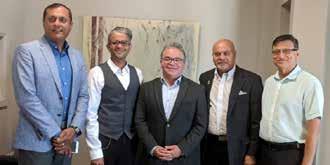
The members informed the Member of Parliament of

Canada India Foundation organized its 3rd Annual Golf Tournament on Wednesday August 2018 at the Royal Ontario Golf Club in Huron, ON. Although the weather decided to play the spoilsport initially, the day turned out to be perfectly fine for golf enthusiasts who wouldn’t be cowered down even by the thunderstorm in the afternoon that threatened to end the tournament prematurely. In the end, nothing came in the way of these golf enthusiasts, who made merry on the golf course, partaking in the choicest Indian delicacies and an exotic choice of beverages. A young team comprising Curren Hola, Sanjay Agnihotri and Neel Patel won the tournament. The runners-up team comprised Ajay Tandon, Avtar and Janak Bhawnani.
Continuing its practice of contributing to the armed forces in Canada and India, CIF contributed $10,000 each to the 32nd Service Battalion Regiment of the Canadian Armed Forces, and $10,000 to the families of the fallen soldiers through the Indian Bravehearts (Bharat Ke Veer) portal. An armoured vehicle of the Canadian Armed Forces was at the golf course on display.

Dr. Gupta spoke to CIF members and guests on August 21, 2018 on necessary precautionary measures that everyone, and especially Canadians of Indian origin, need to take to prevent heart disease. He said that the prevalence of heart disease amongst South Asians has been on the rise. The talk was followed by an hour-long Q&A.
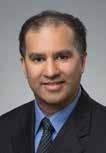
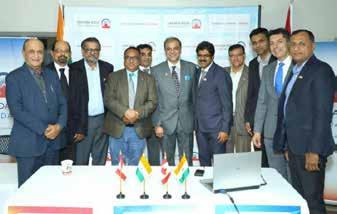
Anil Arora, Chief Statistician, Statistics Canada, highlighted the role of Canadians of Indian origin in the Canadian society and especially its economy at an exclusive Speaker Series organised by Canada India Foundation Tuesday 9 October at Oakville. In a session that witnessed unprecedented participation, Mr. Arora also highlighted the modernisation drive undertaken by Statistics Canada in its centenary year to generate data that will enable real time policy decisions.
Delineating the role of Canadians of Indian origin in the Canadian economy, Mr. Arora said, their number is rising. According to the 2016 Census of Population, 8.9% of Canada’s total immigrant population was born in India. Immigrants born in India constitute Canada’s largest immigrant group by country of birth, ahead of China (8.6%) and the Philippines (7.8%). He said, about half of immigrants who came to Canada from India between 1980 and 2016 were sponsored by a family member. Most others were admitted under economic class programs. More recently, immigrants born in India represented 12.1% of all immigrants who came to Canada between 2011 and 2016, second only to those from the Philippines (15.6%).
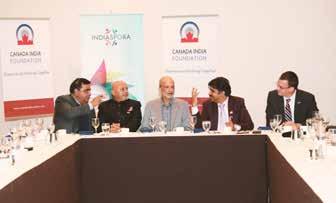
Canada India Foundation in conjunction with Indiaspora organised a networking dinner reception for the Indiaspora delegation visiting Canada from the United States of America on Sunday 14 October 2018 at Sheraton Centre Toronto. CIF members discussed topics of mutual interest such as venture capital, educational bursaries and philanthropy with Indiaspora delegation. Hon. Monte McNaughton, Ontario’s Minister for Infrastructure, Hon. Deepak Obhrai, MP, Dr. Asha Seth, Former Senator, were the VIPs who participated in the program. In his remarks Hon. Minister McNaughton said that Ontario is geared to work closely with India to build strong economic ties and would utilise the immense talent pool of Indo-Canadians as a leverage to improve relations with India. He also welcomed the attempt to forge a three-nation relationship, and assured cooperation to ensure that such an endeavour would succeed.
In an address to prominent members of the IndoCanadian community, Andrew Scheer, Leader of the Conservative Party of Canada, reiterated his commitment made to India’s Prime Minister Narendra Modi to find ways to ship Canadian oil and gas to India to meet its voracious energy needs. Mr. Scheer was speaking at an exclusive interactive luncheon organised by Canada India Foundation (CIF) at the University Club in downtown Toronto on 18 October 2018. The response to CIF’s event, appropriately dubbed ‘Setting the Agenda’, was overwhelming, and some guests had to stand throughout the hour-long program.
Attendees included business and community leaders, academicians, government officials, political leaders and members of the diplomatic corps. He emphasized
that his recent visit to India was indicative of India’s significance to Canada and to the Conservative Party of Canada.
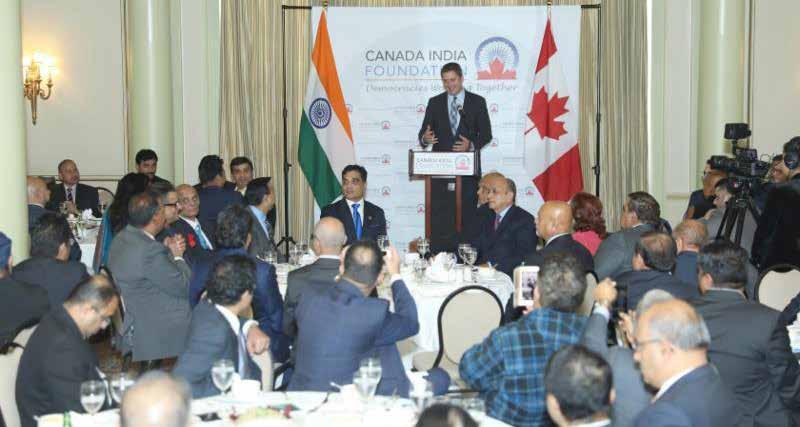
Describing his visit as “extremely successful,” Mr. Scheer explained that his week-long trip, during which he met India’s Prime Minister and four other ministers, was his third trip abroad – the first was to the United States and the second was to the United Kingdom.
Exports; and Members of Parliament Hon. Ruby Sahota, Hon. Sonia Sidhu, Hon. Kamal Khera, Hon. Jati Sidhu, Hon. Chandra Arya. Hon. Ramesh Sangha, MP, organised these meetings.
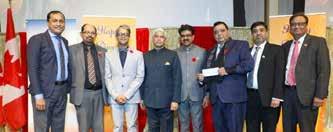
4 November ‘India to be economic superpower’ – Dr. Swamy
India has the potential to emerge as an economic powerhouse in the next decade if it consistently follows economic policies that encourage innovation and entrepreneurialism, said Dr. Subramanian Swamy, Member of India’s Upper House (Rajya Sabha), at an exclusive interactive luncheon session organised at the Sringeri Vidhya Bharati Foundation (SVBF) on Sunday 4 November 2018 by Canada India Foundation.
Canada India Foundation was one the main supporters of the 18th edition of Hon. Deepak Obhrai’s National Diwali Celebrations on Parliament Hill in Ottawa. A delegation of the Foundation’s members participated in the program that saw unprecedented participants of over 500 IndoCanadians from different parts of Canada, including Calgary, Montreal, Toronto, and, of course, Ottawa. Prior to the Diwali celebrations, the CIF delegation met with Hon. Mary Ng, Canada’s Minister of Small Business and
The program was greeted with overwhelming response both in terms of participation and appreciation by over 400 guests. Dr. Swamy, a Harvard-trained economist, who was also a professor at the same university, stressed the importance of implementing marketfriendly economic policies to sustain the economic growth that India has experienced since its economy was liberalised in 1991.
“The Chandra Sekhar government liberalised the economy in 1991, when I was the finance minister. The PV Narasimha Rao government and every subsequent government continued with the liberalisation process,” he said, adding, “India has routinely registered 8% growth rates thanks to economic liberalisation.” He emphasized that the growth rate under the present government of
Narendra Modi has been substantial more. “If India can sustain 10 % to 12 % growth rate for the next decade, it will emerge as a developed economy by 2030.”
Members of Canada India Foundation met Hon. Mary Ng, Canada’s Minister for Small Business and Export Promotion at a meeting organised by MPs from Liberal Party in Brampton on 12 November 2018. Members of other bilateral trade promotion organisations were also present at the meeting. The theme of the meeting was to promote export opportunities for SMEs and to highlight the importance of export and entrepreneurship.
participated in the reception. Mr. Brown observed that members of the Foundation had continued to support him even during the tough political phase in 2018. He said that it was their support that made him consider returning to the political arena and contest the Brampton mayoral pools. He thanked the Foundation members and pledged to make Brampton a business friendly city.
Canadian small and medium-sized enterprises (SME) are a key component in expanding Canadian trade and growing the economy. Minister Ng participated in a discussion on the importance of trade deals like the United States-Mexico-Canada Agreement (USMCA) and promoted the opportunities and supports available for businesses to start up, scale up and access new markets. The Minister continued these discussions at a roundtable with members of the Canada-India export business community.
Canada India Foundation members organised a dinner reception to celebrate Patrick Brown’s victory in the Brampton Mayoral elections after his oath ceremony. The program was organised in collaboration with the Pearson Convention Centre and Mr. Brown’s wife also
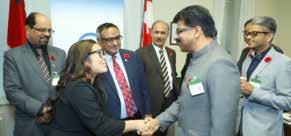

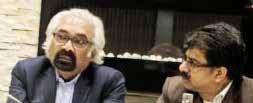
Members of Canada India Foundation met Sam Pitroda, on Saturday, 17 November 2018 at an exclusive interactive session in Mississauga. A man of ideas, and a thought-leader, Pitroda single-handedly transformed India’s telecommunication sector bringing it on par with the best in the world. He made an impassioned plea to ensure that the idea of India, based on democracy, freedom, inclusiveness, diversity, and scientific approach, continues to remain relevant in the future.
CIF members participated in a lively debate with Mr. Pitroda, who gamely answered questions and engaged in a discussion on Indian politics. He gave a number of examples on the different ways in which Indo-Canadians can participate in the transformation of India by providing expertise at the grassroots level. Mr. Pitroda gave the example of how his team was able to utilize solutions provided by IIT graduates to introduce technological innovations into the manufacturing of brass ware in northern India. “Such innovations are much-needed

at the grassroots level and can bring about qualitative changes in the production methods,” he said.
Hon. Caroline Mulroney, the Attorney General of Ontario and the Province’s Minister for Responsible for Francophone Affairs met with members of Canada India Foundation 25 November, 2018 to discuss the new measures that the Doug Ford government in Ontario is undertaking to introduce and implement new businessfriendly measures aimed at reviving the economy and generating more jobs. Hon. Mulroney said the new Doug Ford government has clearly defined business-friendly policies that will show results soon. She emphasized that the new government is cognizant of the people’s expectations about being fiscally disciplined and have already implemented a series of policies that will ensure long-term sustainable growth.


honour and we are proud of his achievement.” Mr. Satish Thakkar, National Convener, CIF, said, “Mr. Ramesh Chotai commands great respect from the Indo-Canadian community because he always puts the community first and comes forward to help. This award is a recognition of his indefatigable spirit.”


Congratulatory messages poured in from across Canada to Ramesh Chotai, the co-founder and past chair of Canada India Foundation on being awarded the prestigious Pravasi Bharatiya Samman Award, the highest civilian award bestowed upon overseas Indians by the Government of India. Mr. Chotai was honoured with the award by the President of India His Excellency Ram Nath Kovind at a glittering ceremony on 23 January, the concluding day of the Pravasi Bharatiya Divas, the annual conglomeration of the Indian diaspora, held this year in the holy city of Varanasi, India. The Canada India Foundation had nominated Mr. Chotai for the award. Mr. Anil Shah, Chair, CIF, said, “Ramesh Chotai epitomizes the strength of the Indian diaspora in Canada. He has selflessly and sincerely worked for the Indo-Canadian community for nearly five decades. He deserves this
Canada India Foundation leaders met the Indian High Commissioner His Excellency Vikas Swarup for a luncheon meeting on 16 January 2019 in Richmond Hill. “We had a great engaging lunch with the High Commissioner, Vikas ji,” said Satish Thakkar, National Convener, Canada India Foundation. The High Commissioner agreed to CIF’s suggestion of holding quarterly meetings. Among other topics discussed included the organizing a celebration to commemorate the 550th birth anniversary of Guru Nanak, to launch a political mentoring program to produce the next generation of Indo-Canadian decisionmakers.
Pierre Cléroux, the Chief Economist and Vice President, Research, of Business Development Bank of Canada (BDC), said that while the Canadian economy is decelerating, the three questions on everyone’s mind –whether interest rates will rise, whether labour shortages will end and whether there will be a recession – may all be answered in the negative. Addressing the participants during Canada India Foundation’s Speaker Series on 16 April 2019, Mr. Cléroux emphasized that all indications seem to suggest a global economic deceleration. The Speaker Series saw enthusiastic participation from CIF members and guests comprising entrepreneurs, business professionals and leading members of the community. Pankaj Dave, Co-Convener, CIF, welcomed the participants. Ramesh Chotai, one of the founding members of CIF, who was recently awarded the Pravasi Bharatiya Samman Award also spoke on the occasion.
Hon. Mary Ng, Canada’s Minister for Small Business and Export Promotion, inaugurated the conference and gave the keynote address. Brampton’s Mayor His Worship Patrick Brown gave a special address at the conference and Hon. Ruby Sahota, MP, delivered the closing remarks.
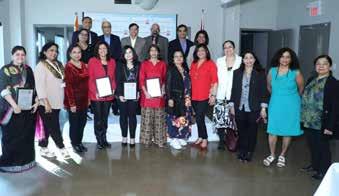
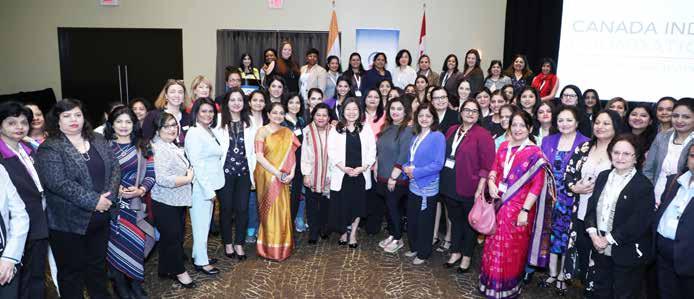
The conference comprised three panel discussions, three workshops, and a firside chat.
Panel discussions:
• Startup, Scale up and accessing new markets
• Inspiring case studies of women operated companies
• Innovative entrepreneurs: Turning ideas into business
Workshops:
• Exploring global markets (by EDC)
• Women Entrepreneurship Knowledge Hub (by Diversity Institute)
• Government grants for business (by Gerry Fung)
Fireside chat on financing a new business was conducted by BDC.
On the second day of the conference a focused group discussion on women empowerment was organised. Sneha Kapadia moderated the discussion, which saw participation by women leaders from political and business segments and included Hon. Nina Tangari, MPP; Hon. Dipika Damrela, Councilor, Ward 7, Mississauga; Hon. Sameera Ali, Councilor, Ward 4.
City of Brampton’s Community Grant Program, Business Development Canada (BDC) and Export Development Canada (EDC) are the sponsors.
The conference was supported by Shirin Mandani, CEO of GrantX Inc, which provides services for resource and organization development to many charities and not-for-profit across North America, and by Artists and Artisans Development and Network (AADN).
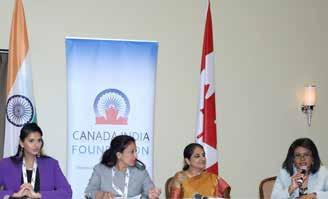
Canada India Foundation’s Co-Convener, Pankaj Dave, led a trade mission to India in January 2019 comprising Canadian small entrepreneurs and academicians.
The Mission included organizing the Higher Education Forum in New Delhi and Gandhinagar. CIF also signed a Memorandum of Understanding with the Gujarat Chamber of Commerce and Industry and participated in the Vibrant Gujarat Global Summit 2019. As a part of Vibrant Gujarat 2019, CIF participated in the Global Conclave of Chambers of Commerce.
In addition to the Higher Education Forum and Vibrant Gujarat 2019, CIF also held round table discussions with the Canadian High Commission Trade Commissioners in New Delhi, the Confederation of Indian Industry and the Research and Information Systems for Developing Countries in New Delhi.
In New Delhi, 16 January 2019
• Canadian High Commission, New Delhi
• Confederation of Indian Industry, New Delhi
• Hon. Anurag Thakur, MP
• Research & Information Systems for Developing Countries, New Delhi

In Gandhinagar, 18, 19 & 20 January 2019
• Dinner with Mayor of Ahmedabad Bijal Patel
• MoU with Gujarat Chamber of Commerce and Industry
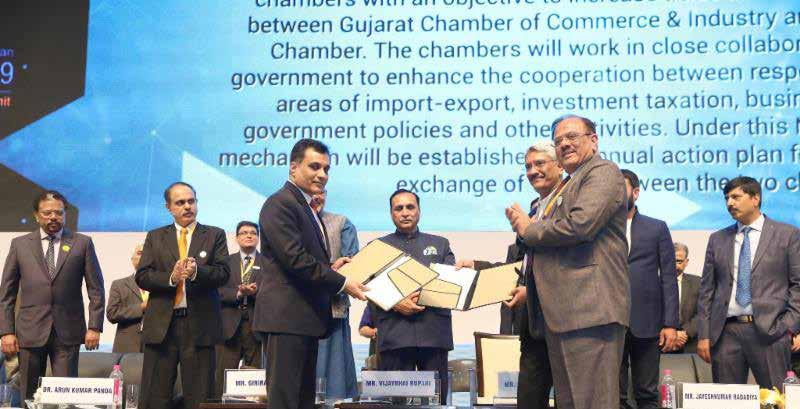
Political meetings with
• Hon. Vijay Rupani, Chief Minister of Gujarat
• Hon. Nitin Patel, Deputy Chief Minister of Gujarat
• Hon. Bhupidersinh Chudasma, Minister for Education, Gujarat
• Hon. Parshottam Rupala, Union Minister of State for Panchayati Raj, Agriculture and Farmers Welfare
CIF also organised the Higher Education Forum in New Delhi and in Gandhinagar during the India Mission. In New Delhi, CIF’s partners were PHD Chamber of Commerce and Industry and Seneca College, and in Gandhinagar, CIF’s partners were the Government of Gujarat and the Pandit Deendayal Petroleum University.


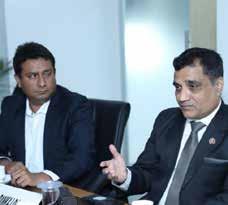
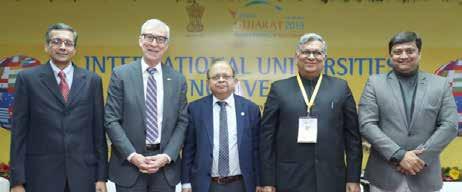

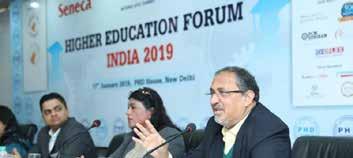
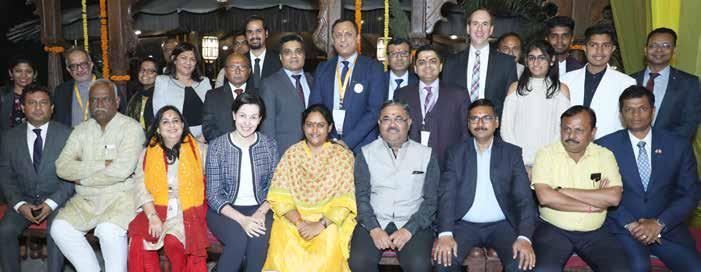
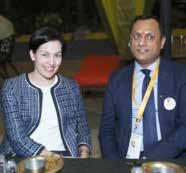



















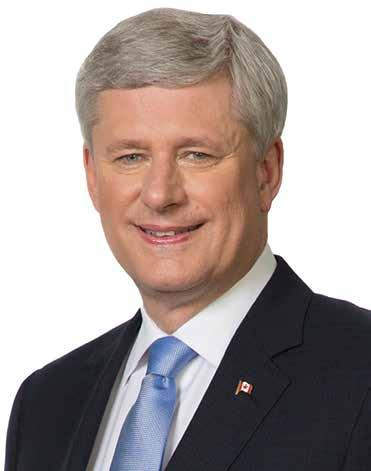


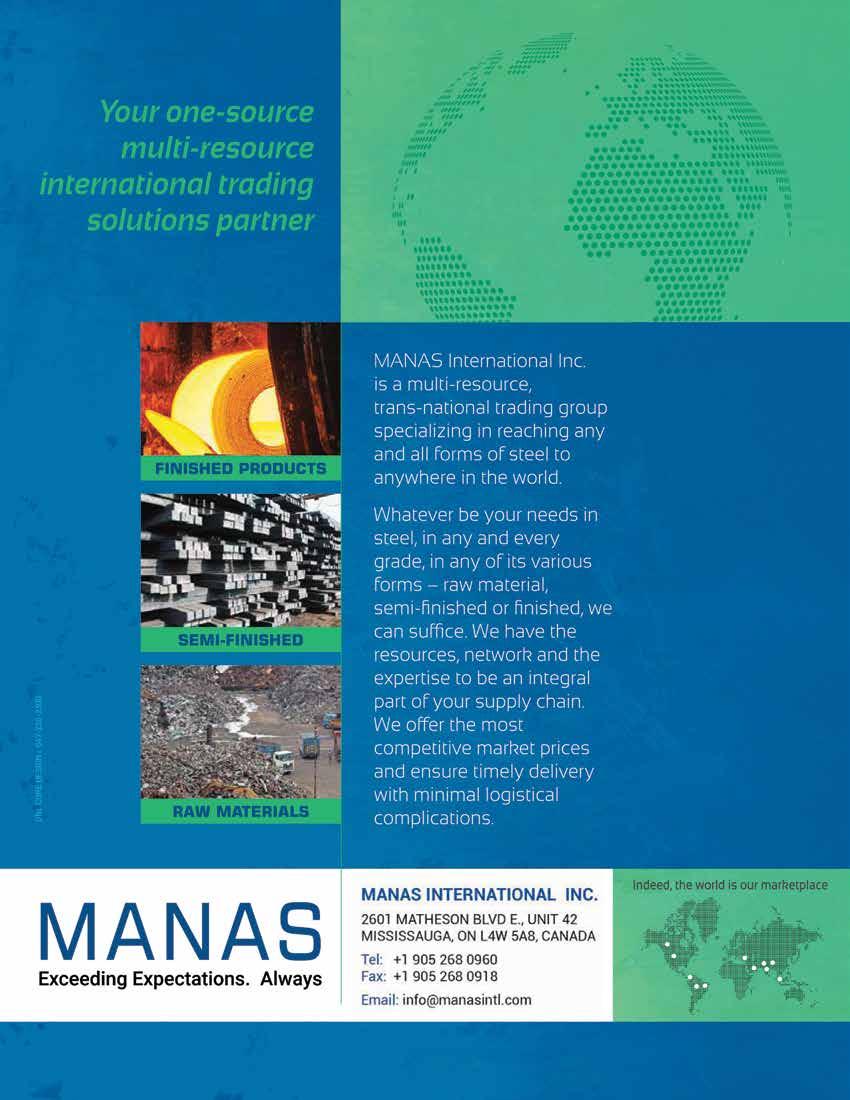









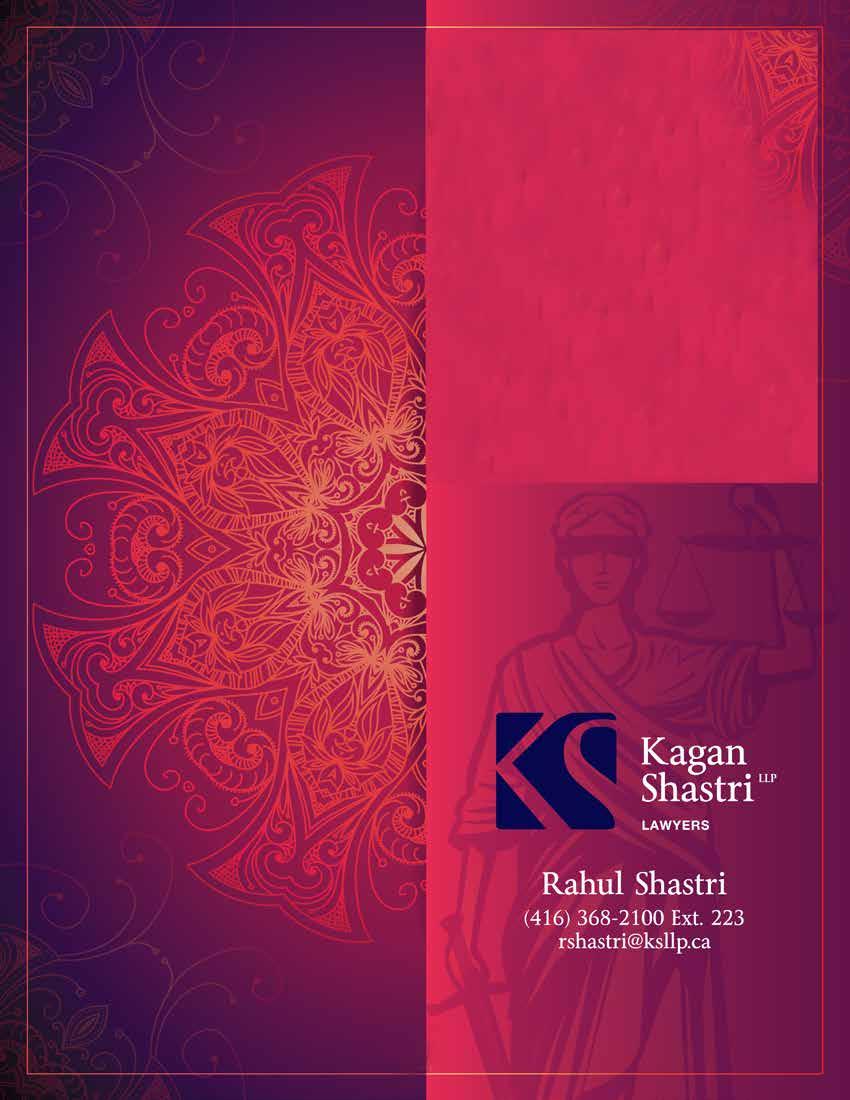
Congratulations Rt. Hon. STEPHEN HARPER on receiving the Canada India Foundation Award
Process Research ORTECH Inc was formed in January 1999 to take over the Process Technologies division of ORTECH Corporation (Formerly Ontario Research Foundation) under the privatization scheme of the Ontario Government. The mandate of this company is to continue the research and development work carried on by this division of ORTECH Corporation for the past 70 years, and to explore innovative solutions in this area to better serve the needs of Canadian industries as well as international com panies.
Process Research ORTECH (PRO) is now a privately owned organization serving mining, metallurgical, recycling and chemical industries. Recognizing the need for sustainable development for these industries the company has expanded to offer its clie nts process technologies for economic advantage, environmental stewardship and societal care. PRO, a world class service facility with its laboratory and pilot plant offers services on:


Technology development
Technology transfer
Pre commercialization trials
Engineering assistance, Market evaluation
Sustainable development
Clean technology
development


Congratulations to Hon. Stephen Harper on receiving the Global Indian Award & best wishes to Canada India Foundation for the 2019 Annual Gala



















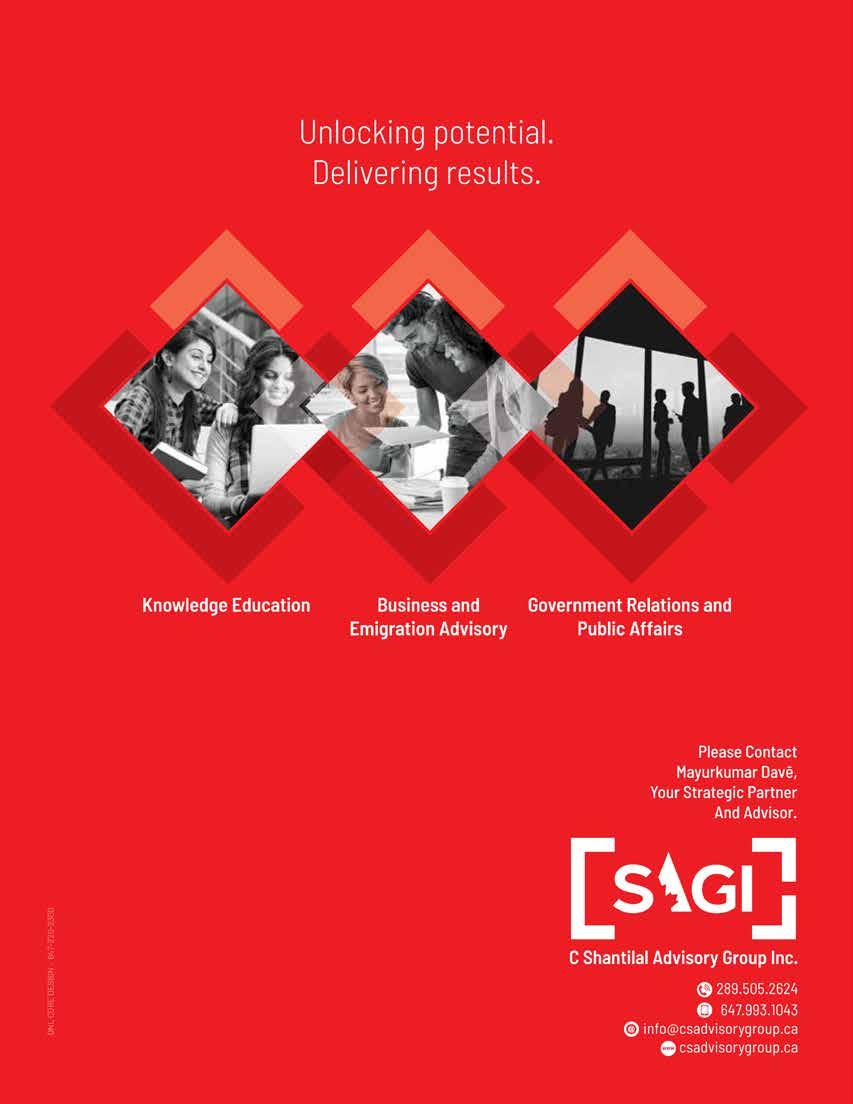



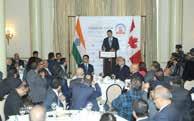
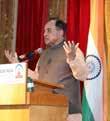


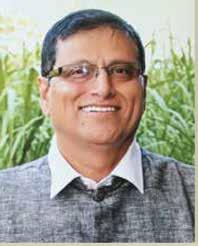








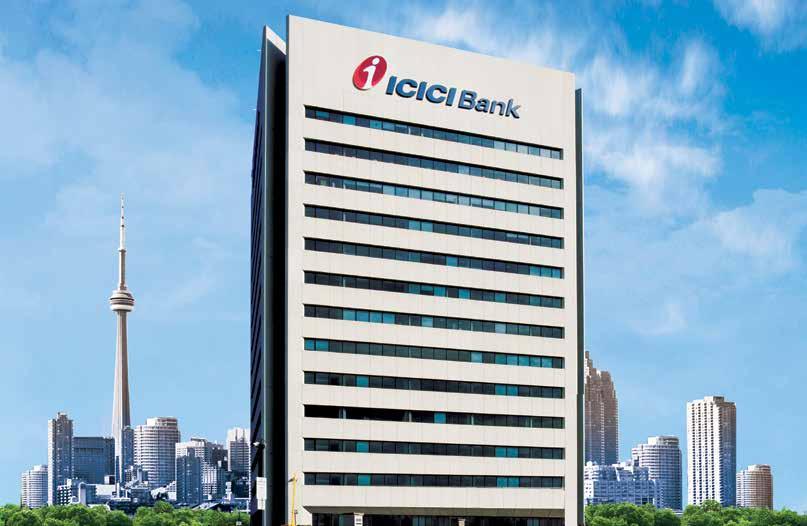
When India is your destination, the best way to get there is on North America’s Best Airline. Enjoy our award-winning service including next generation lie-flat seats in Air Canada Signature Class, a spacious Premium Economy Class and enhanced comforts in Economy Class. Your journey will make you feel right at home with Hindi and Punjabi speaking flight attendants, a choice of Indian meals, and a selection of Bollywood movies and music.

Air Canada offers year-round non-stop flights from Canada to India*. Book now at aircanada.com or contact your travel agent.

